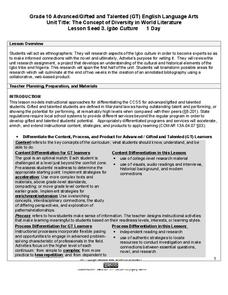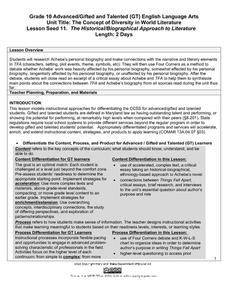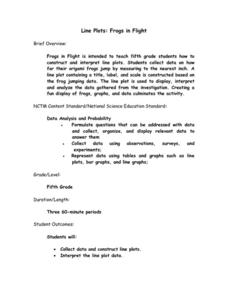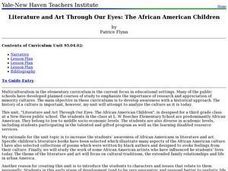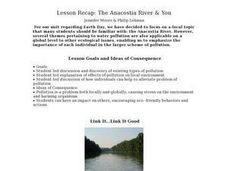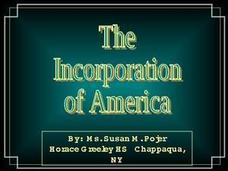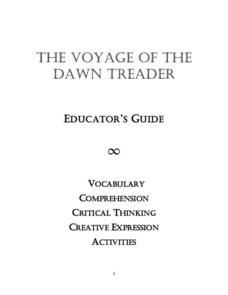Maryland Department of Education
The Concept of Diversity in World Literature Lesson 3: Igbo Culture
What cultural concepts must readers understand in order to connect to Things Fall Apart? As part of their study of Chinua Achebe’s novel, class members research Nigeria and the Igbo culture to create a collaborative, web-based,...
Maryland Department of Education
The Concept of Diversity in World Literature Lesson 4: Proverbs
"Eneke the bird says since men have learnt to shoot without missing, he has learnt to fly without perching." As part of their study of Things Fall Apart, class members read Paul Hernadi and Francis Steen's essay, "The Tropical Landscapes...
Maryland Department of Education
The Concept of Identity Lesson 8: Propaganda in Visual Media
Visual and print propaganda are featured in a instructional activity that asks readers of A Separate Peace to examine the techniques used in propaganda from World War I, World War II, presidential elections, and in the novel.
Maryland Department of Education
The Concept of Identity Lesson 4: The Psychological Approach
Readers apply Sigmund Freud's theories of the unconscious mind and the psychological approach to literary criticism to analyze and evaluate the relationship between two characters in A Separate Peace.
Maryland Department of Education
The Concept of Diversity in World Literature Lesson 12: Author's Purpose - Yeats and Achebe
Is there such a thing as fate/luck? Can one fight destiny? As part of their study of Chinua Achebe's purpose in writing Things Fall Apart, class members answer these questions from Achebe's point of view and then from William...
Maryland Department of Education
The Concept of Diversity in World Literature Lesson 13: Unit Culmination - Symposium
To conclude a unit on the concept of diversity in world literature, class members conduct a symposium on "African Literature in Global Perspectives." In order to earn a spot on the panel, individuals craft an original thesis that...
Maryland Department of Education
The Concept of Diversity in World Literature Lesson 10: Author's Purpose Seminar
Why did Chinua Achebe write "An Image of Africa: Racism in Conrad's Heart of Darkness" in response to Conrad's novel? As part of a study of Things Fall Apart, class members conduct a socratic seminar focused on Achebe's purpose and...
Maryland Department of Education
The Concept of Diversity in World Literature Lesson 11: The Historical/Biographical Approach to Literature
How affected is Thinks Fall Apart by Chinua Achebe's personal biography? Using a four corners strategy, and evidence from their readings, class members debate the degree of biographical influence in Achebe's novel.
Maryland Department of Education
The Concept of Diversity in World Literature Lesson 9: Debating Imperialism
To gain an understanding of Imperialism, class members read Rudyard Kipling's poem, "The White Man's Burden" and Mark Twain's essay, "To the Person Sitting in Darkness." Groups compare these perceptions of non-white cultures with the...
Curated OER
New York State Testing Program: English Language Arts Book 2
Practice listening and writing skills with this resource. This is a test created by the New York State Testing Program. Learners listen to a passage called "Leonardo da Vinci's Mona Lisa" twice and write responses to the selection. They...
National Security Agency
Line Plots: Frogs in Flight
Have a hopping good time teaching your class how to collect and graph data with this fun activity-based lesson plan series. Using the provided data taken from a frog jumping contest, children first work...
College Board
AP® Computer Science A: Elevens Lab Student Guide
Looking for a project to use in an AP® Computer Science class? Engage learners with a simple solitaire game called Elevens. Through these activities, learners break down the task and write the code for a game. Sign in to your College...
Curated OER
Jim Crow Lesson Plan
Jackie Robinson's attempt to earn a spot on the 1946 Brooklyn Dodgers provides learners with an opportunity to examine the Jim Crow laws and revisit issues of segregation and integration. "The Unconquerable Doing the Impossible: Jackie...
Curated OER
The Art of Interpreting Percent
Ddefine the relationships between fractions, decimals, and percentages in a series of lessons. The class practices converting between these three versions of a number. They also find the common factor of a numerator and denominator and...
Curated OER
Storytelling
Show young readers how to put some personality and voice into their storytelling with an in-depth assignment. Kids practice saying the same thing, such as counting from one to ten, in different tones and perspectives, and then work on...
Child Care Lounge
Learning Foundations Curriculum
Here is a collection of activities that complements each of the five senses. Youngsters explore textures, sounds in song, food tastes and aromas, colors and patterns, and a variety of experiences that boost...
Curated OER
Henry Wadsworth Longfellow's Christmas Bells
Students read and analyze the anti-slavery poem, "Christmas Bells" by Henry Wadsworth Longfellow. They discuss the content and form of the poem, write an essay, write an original poem, examine how this anti-slavery poem was converted...
Curated OER
Literature and Art Through Our Eyes: African-American Artists
Examine the contributions of African-Americans in the worlds of art and literature. Over the course of a few days, young scholars will read and analyze a poem, a short story, and a piece of art. They complete a range of...
Curated OER
Lesson Recap: The Anacostia River & You - Biology Teaching Thesis
Seventh graders give examples of local sources of pollution and postulate reasons as to why local sources of pollution can harm the ecosystem. They address the following question in short answer form: "Why is litter/chemical pollution...
Curated OER
Japanese Festivals and Holidays
Bring the excitement and beauty of Japanese festivals into your classroom. Kids with special needs create calendars that reflect special festivals and holidays common to Japanese culture. They start the project by creating a list of...
Curated OER
Planning a Community Event
Students work together to organize a fundraiser. In this community event lesson, students work collaboratively to plan and organize a fundraiser. Students create a timeline, venue and advertisements for the event.
Curated OER
The Incorporation of America
The incorporation and industrialization of America is covered in this image-rich slide show. While text is limited, there is no shortage of great images showing the progression and causes of American Industrialization. Perfect...
C.S. Lewis Foundation
Educator’s Guide to The Lion, The Witch and the Wardrobe #2
This chapter-by-chapter guide to The Lion, The Witch and the Wardrobe, designed to be used in either a classroom or homeschool setting, contains vocabulary lists, discussion questions, and writing prompts.
C.S. Lewis Foundation
Educator’s Guide to The Voyage of the Dawn Treader
The Voyage of the Dawn Treader guide includes chapter-by-chapter vocabulary lists and quizzes, discussion questions and writing prompts, and an explanation of Narnia expressions. Great for mainstream classrooms and homeschool situations.


